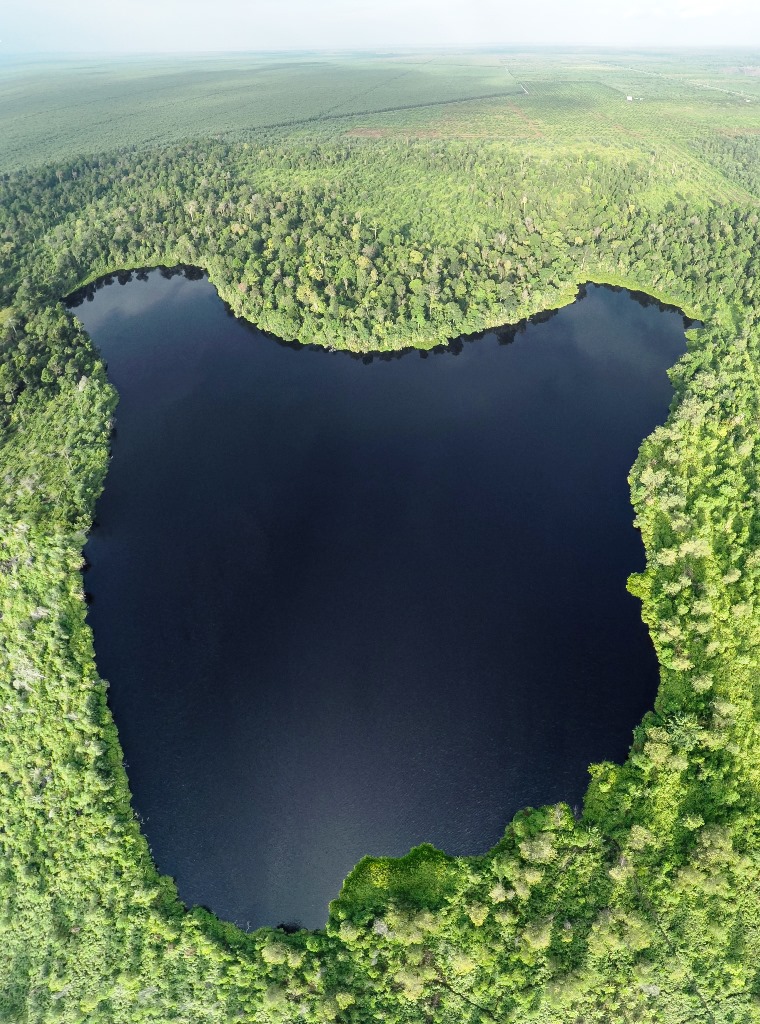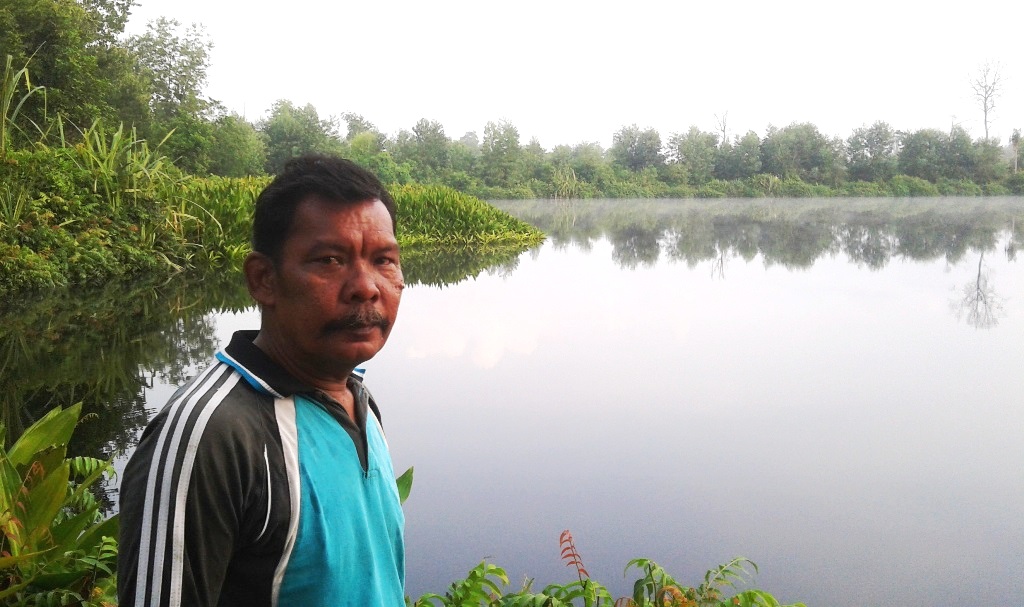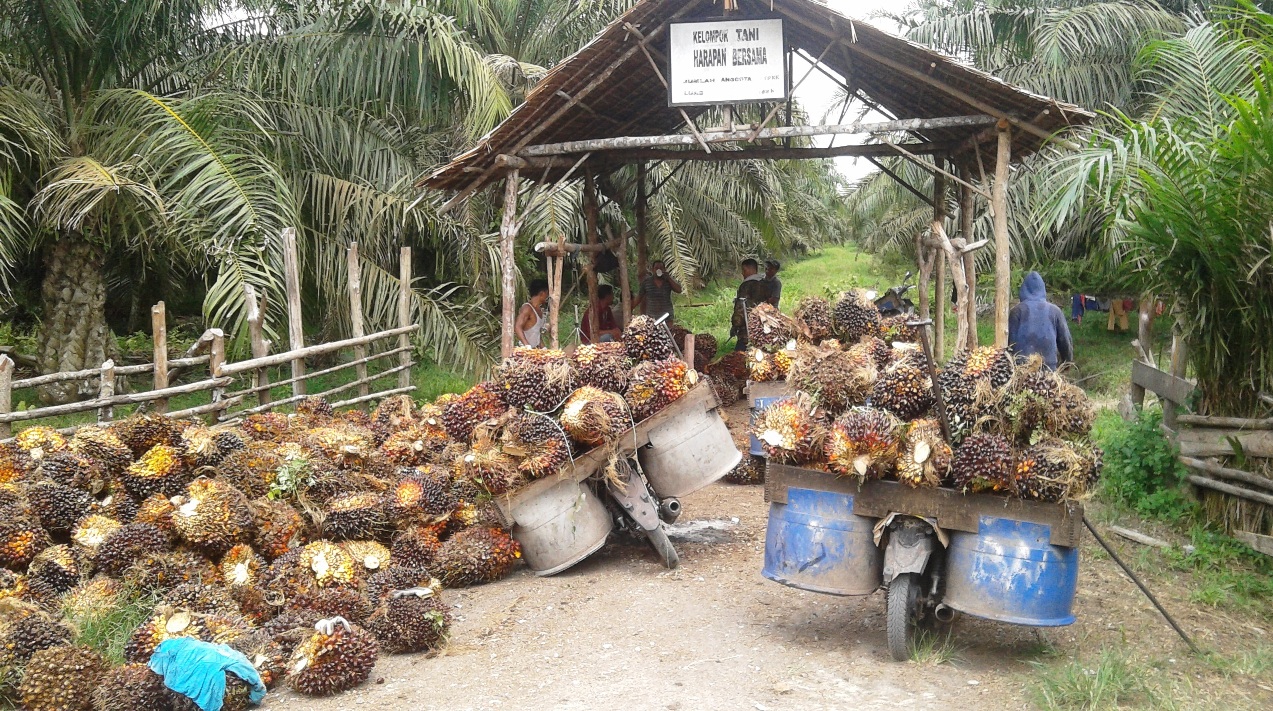The Indonesian village of Dosan sits on the edge of the Kampar Peninsula, an enormous swath of peat in Riau province on the island of Sumatra. The peninsula is one of the last strongholds for the critically endangered Sumatran tiger and constitutes one of the world’s largest carbon stores.
It is also fast disappearing. Over the past decade, oil-palm and rubber plantations have reduced the size of the 700,000-hectare peatland by nearly half.
Of the 400,000 hectares that remain, 300,000 have been handed as concessions to pulp-and-paper giants APRIL and Asia Pulp and Paper, which plan to establish rubber estates. A modest amount of land has also been zoned for oil palm.
The present era of forest loss here dates back to 2003, when the district government freed 3,500 hectares for conversion. With Dosan among the seven villages covered by the regulation, residents were granted permission to plant oil palm on 723 hectares of forestland. They did so with gusto.
Though the nascent industry generated much-needed cash, forests had to be cleared to make way for the plantations, causing unforeseen environmental effects, said Firdaus, chief of Dosan.
“At first we weren’t too worried about the negative effects of the oil-palm expansion. But then, for long periods of time, the heat just wouldn’t lift. It was much different from just a decade ago,” Firdaus said.
“In the dry season, meanwhile, wildfires are everywhere, and the haze disturbs the villagers.”
Those developments gave rise to a grassroots effort to save 400 hectares of forest around Naga Sakti Lake, a major water source for the village.
Many hope the community mobilization, which culminated in a 2011 village agreement to halt further deforestation, inspires similar efforts in nearby communities.

From fishing to farming
Curiously, the conservation drive has been steered by a Dosan native named Dahlan, 53, the same man who trumpeted the benefits of palm-oil production in the village some 20 years ago.
In 1988, Dahlan volunteered for the government’s transmigration program and was relocated to Lubuk Dalam village in Riau’s Siak district. He received two hectares and began to learn the ins and outs of oil-palm and rubber farming.
Seven years later he returned to Dosan, which at the time was mainly a fishing village, to teach locals about farming.
“I saw the prosperity that came to Lubuk (from palm oil). So, I returned to Dosan to help develop the village,” he told Mongabay-Indonesia.

The villagers’ reaction to Dahlan’s plan was mixed. Dosan lacked an access road, and locals doubted the Siak River could serve as a viable transport route. Even after Dahlan convinced the government to construct a road, locals refused to cede land needed to build it.
“At the time I was very sad. I was even threatened with weapons,” Dahlan said. “There were about 32 families who did not understand the benefits of palm oil, and so they did not agree.”
Undeterred, Dahlan continued to try to convince locals of the benefits palm-oil production would bring to the community.
In 2003, after a couple years on the stump, Dahlan formed the Bungo Tanjung Village Cooperation Unit (KUD) with 300 other local farmers.
It would take five years, however, for the palm trees to begin producing fruit.
Environmental fallout
Historically a community of poor fishermen (one long classified as “IDT” or “left behind” by the government) the move to plantation agriculture gave Dosan an economic boost, helping to ease poverty, bring about the construction of infrastructure like concrete bridges and, in April, usher in a district-level market expected to double cash turnover in the village.
According to Firdaus, just a decade ago nearly all village residents were recipients of zakat, a government welfare program that taxes wealthier citizens and redistributes the income to the poor.
“But that was before. Now you can ask the people. Praise be to God, now they are the ones being taxed,” Firdaus said.
According to Efende, a high-school teacher in Dosan, the economic benefits have also improved education prospects for young people.
“With the arrival of oil palm, all aspects of life have improved. If before it was enough for the first child to complete primary school or junior high, now many are moving on to college,” he said.

As in other areas where palm-oil production has gained a foothold, in Dosan there’s no such thing as a free lunch — the deforestation that was required to make way for the planting of palm trees has triggered forest fires, haze and blistering heat waves.
In 2011, driven by the concerns of hundreds of locals, the village government passed a regulation to protect the 400 hectares of forest near Dana Naga Lake. The effort was supported by NGOs like the Riau-based Eagle Society and Greenpeace as well as the Bungo Tanjung KUD formed by Dahlan.
The pledge also bans additional forest clearing village-wide.
“The conservation commitment in Dosan is crucial for the preservation of the Kampar Peninsula,” Susanto Kurniawan, director of the Eagle Society, told Mongabay-Indonesia. The Siak administration, he added, was planning to replicate the conservation model in other villages.
Finding a balance
In addition to advocating for the conservation of forests, the cooperative has introduced environmentally friendly ways of optimizing yields, including the construction of irrigation canals that keep crops healthy during the dry season.
Such efforts have earned the KUD Bungo Tanjung plaudits from the Roundtable on Sustainable Palm Oil (RSPO), a voluntary certification scheme that gave the cooperative membership status in March.
Desi Kusumadewi, head of the RSPO’s Indonesia office, said the cooperative had demonstrated a commitment to sustainable palm-oil production, forest preservation and community empowerment.
“By becoming a member of the RSPO, they can increase efficiency and have greater access to markets, funding and production facilities,” Desi told Mongabay-Indonesia.
Dahlan said he hoped RSPO membership would eventually allow the cooperative to eliminate the “middle man,” but added that obtaining RSPO certification for the cooperative’s operations was still a ways off. (Membership does not equate to certification, which allows palm oil to be marketed under the RSPO’s Certified Sustainable Palm Oil, or CSPO, label.)
“The challenge will be sustaining solidarity among us farmers,” Dahlan said. “We hope that once we get certified we will be able set the price of the (palm) fruit ourselves.”
Despite the long road ahead, Dahlan said he was proud of his community for what had already been achieved.
“We don’t want our grandchildren to ask why we sacrificed the forest for short-term gain,” he said. “The money will run out, but at least this forest will still be here for them.”
Produced in English by Cory Rogers.
CITATION:
Zamzami. “Petani Sawit Pelindung Hutan Danau Naga Sakti.” Mongabay-Indonesia. 1 June 2015.